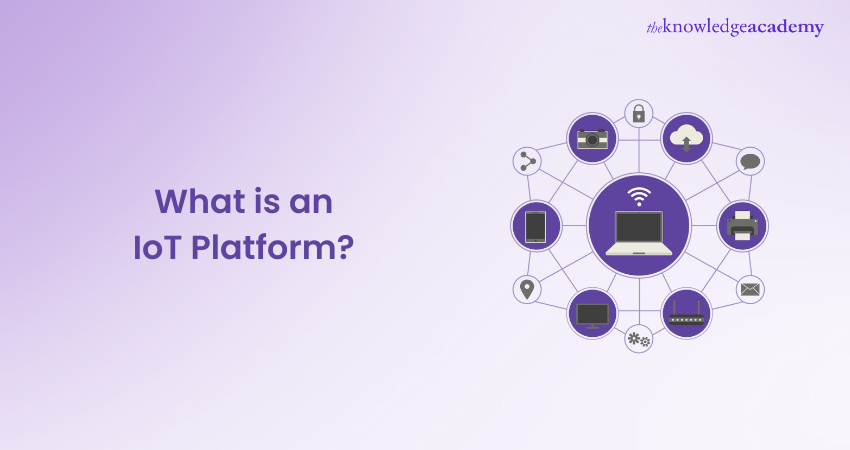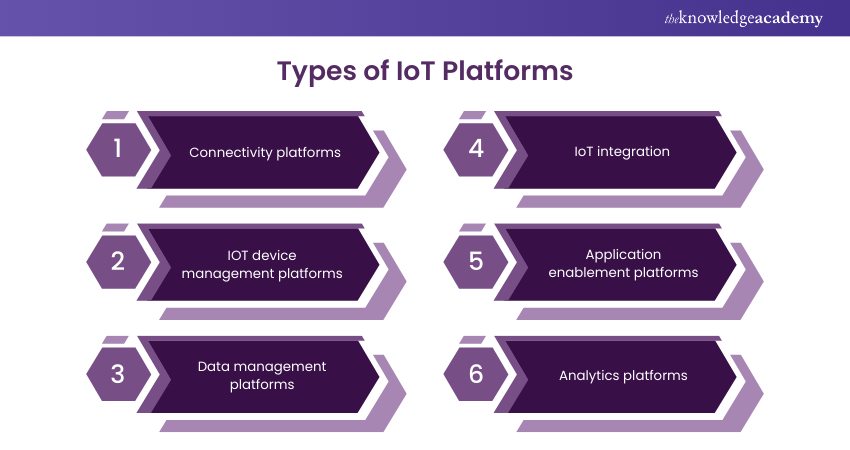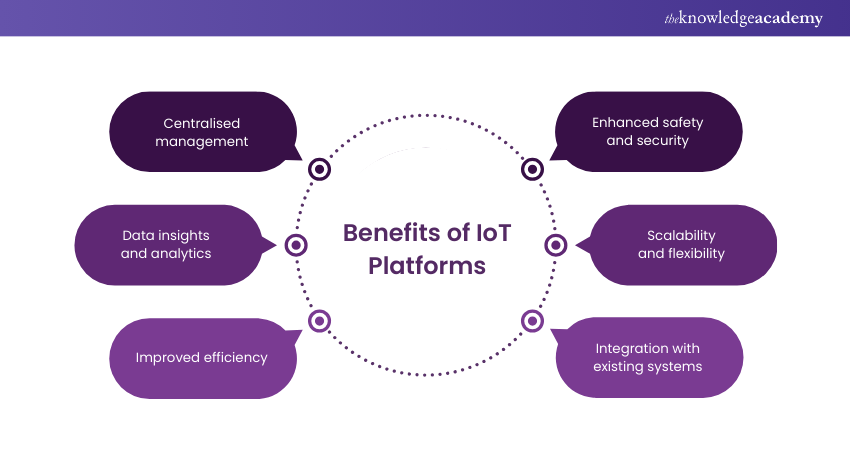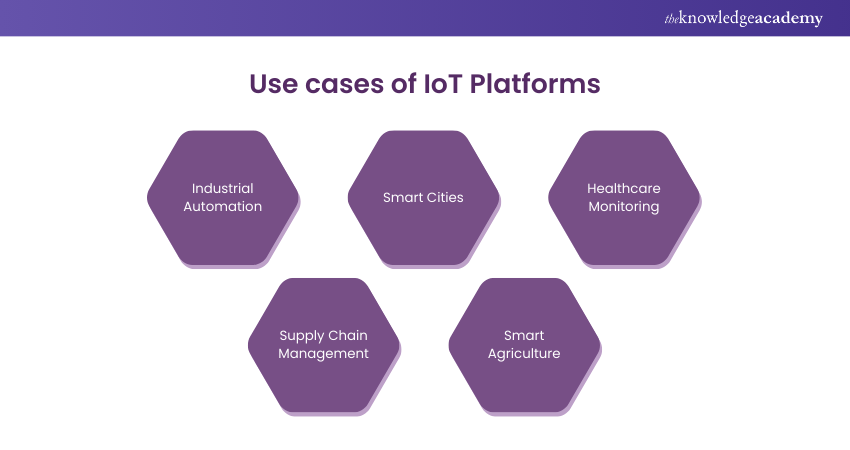We may not have the course you’re looking for. If you enquire or give us a call on +1 7204454674 and speak to our training experts, we may still be able to help with your training requirements.
We ensure quality, budget-alignment, and timely delivery by our expert instructors.

An IoT Platform is a base for managing and integrating IoT Devices that allow communication and control as one. Knowing how to do the basics of IoT Platforms will provide you with the skills you need to be able to further explore their abilities and its wide varied uses in many industries.
This blog specifically discusses IoT Platform and how important it is in the cauldron of technological and innovative world. Familiarise yourself with the thrilling universe of Internet of Things platforms,to find out more read on!
Table of Contents
1) What is an IoT Platform?
2) Why use an IoT Platform?
3) Types of IoT Platforms
4) Benefits and use cases of IoT Platforms
5) Choosing an IoT Platform
6) Conclusion
What is an IoT Platform?
An IoT Platform acts as the central nervous system for your Internet of Things (IoT) devices. Imagine a network of sensors, cameras, and other gadgets collecting data. An IoT Platform connects them, allowing them to communicate and share information. It also provides tools to manage these devices, analyse the data they generate, and even build applications to control them or visualise the data. Think of it as a command centre for your connected devices, ensuring they work together seamlessly and turning raw data into actionable insights.
Why use an IoT Platform?
Here are some key reasons why you should consider using an IoT Platform:
a) Centralised management: An IoT Platform acts as a central hub for managing various IoT devices and systems. This streamlines integration and ensures efficient communication between different devices.
b) Enhanced security: These platforms provide robust security features to ensure data integrity and protect against cyber threats, which is crucial for safeguarding sensitive information.
c) Simplified development: IoT Platforms offer tools and frameworks that simplify the development process. This reduces the time-to-market for new IoT solutions and makes it easier for developers to build and deploy applications.
d) Scalability: IoT Platforms support scalability, allowing businesses to expand their IoT deployments seamlessly without significant infrastructure changes. This accommodates growth and increased device connections.
e) Operational efficiency and innovation: By leveraging an IoT Platform, organisations can enhance operational efficiency, gain real-time insights, and drive innovation through advanced data analytics and automation. This leads to improved decision-making and a competitive advantage.
Types of IoT Platforms
The market offers various IoT Platforms catering to different needs and applications. Understanding these types is crucial for selecting the right one to meet business requirements. Common types include:

1) Connectivity Platforms
Connectivity platforms ensure secure and reliable communication between devices and the cloud. They use protocols like Wi-Fi, Bluetooth, cellular networks, and LPWAN. These platforms handle tasks like registration, authentication, and data routing, enabling seamless data transfer for monitoring and control.
2) IoT Device Management Platforms
These platforms focus on the lifecycle management of IoT devices, handling provisioning, authentication, configuration, and firmware updates. They serve as virtual hubs for monitoring and controlling devices remotely, ensuring efficient operation and maintenance.
3) Data Management Platforms
Data management platforms handle the collection, storage, processing, and analysis of data generated by IoT devices. They offer computational power and intelligence to manage diverse data types, providing tools for big data analytics and aiding decision-making.
4) IoT Integration Platforms
These platforms facilitate the integration of IoT data with other systems, enhancing business value. They allow for seamless automation and transfer of actions, workflows, and processes, often without the need for coding.
5) Application Enablement Platforms
These platforms provide tools and services for building and operating IoT applications. Developers have access to APIs, SDKs, and frameworks, enabling the creation of applications, visualisation dashboards, and analytics modules tailored to business needs.
6) Analytics Platforms
Analytics platforms transform data into actionable insights, using tools for visualisation, data gathering, digital twins, AI, and ML. They enhance IoT development by providing advanced analytical capabilities.
From Beginner to Pro: IoT Interview Questions to Get You Hired!
Benefits and use cases of IoT Platforms
IoT Platforms offer various benefits and use cases. Let’s explore some of them below:
Benefits of IoT Platforms

The fact that IoT Platforms show their full potential in terms of business capabilities by introducing the technology of connected devices and data to their operations can make transformation possible, drive innovations, and create new business models. Here are some similar benefits of these platforms:
Centralised management: IoT Platforms grant centralised control by means of a single dashboard that will let you monitor and control many connected devices from one place. This central control scheme makes it easier to organise the maintenance of devices, and less organisational efforts are required, leading to the improvement of operational efficiency too.
Data insights and analytics: IoT Platforms are the medium for gathering and processing massive amounts of data generated by IoT systems. Through harnessing the potency of analytical abilities in data, the entities will be in a position to acquire precious insights about the data, which will further ease decision-making, predictive maintenance and optimised processes.
Improved efficiency: Through IoT Platforms, automation and monitoring in real-time are possible. It will give an opportunity to increase operational efficiency. Using IoT data, organisations can detect faulty processes or glitches in the working of a process, recognise redundancies, enhance workflow, and plan resources more accurately, allowing them to reduce costs and improve productivity significantly, which in turn can also positively impact IoT Engineer Salary by demonstrating tangible results.
Enhanced safety and security: IoT Platforms, as a matter of fact, have security features like device authentication, data encryption, and access control within themselves to help control the safety and integrity of IoT devices and their data. This minimises risks and secures against unauthorised use. Hence, the central segments of the infrastructure are protected, and sensitive information is not exposed.
Scalability and flexibility: IoT Platforms are purposely created to keep up with the advancement in technologies that comes with the increasing number of connected devices and the changing business needs. They are just perfect for creating flexible architectures that can adapt to any amendments as it may be necessary to add new components for future extension or integration. You can track us should you need more assistance with this or similar topics.
Integration with existing systems: IoT Platforms provide the integration functionalities to better orchestrate the existing enterprise systems like ERP and CRM. Concurrently, the quality of interactions between partners is enhanced. This blending reduces the number of steps of interaction, allows for an exchange of more data, and provides interoperability between different systems.
Turn your IoT ideas into reality with the IoT Projects PDF. Download now for valuable guidance on creating impactful and successful Internet of Things projects.
Use cases of IoT Platforms
IoT Platforms have found applications in various sectors, including smart homes, industrial automation, smart cities, healthcare, supply chain management, and agriculture:

Smart Home Automation: Personal IoT Platforms give owners a chance to operate and program different entities within their homes (e.g. turn on and off the light etc), temperature control, security systems and appliances. Marbling the connected objects and using the IoT Platform will allow users to tailor scenarios, control their homes from a distance and optimise consumption of energy.
Industrial Automation: IoT Platforms are an instrumental part when it comes to industrial production since they collect, and control machines and equipments by the Internet. It enables online rundown, preventive maintenance, assistance and optimisation of industrial operations, resulting in better efficiency, lower downtime, and lower costs.
Smart Cities: IoT Platforms serve as a catalyst for the process of smart cities construction and make possible an interconnecting and managing of different infrastructure elements, including transport systems, waste management, energy grid, and government services. Through IoT Platforms, we can get rid of the resource-inefficiency, and accomplish traffic optimisation with section of solutions that are environmentally friendly.
Healthcare Monitoring: The presence of IoT platforms in healthcare is not just about patient health monitoring but also includes inventory management and remote patient monitoring activities. IoT in Healthcare enables providers to access real-time data, analyze it, and instantly share information with patients through the platform, enhancing healthcare delivery and reducing hasty reactions.
Supply Chain Management: IoT Platforms become the enablers of supply chain visibility by providing a global access to tracking and monitoring of goods across the integrated chain of processes. They empower hundreds of producers through online sales channels, which proves that sustainability and inclusive trade go hand in hand. This is both possible and vital.
Smart Agriculture: IoT in Agriculture is used to regulate the irrigation process, to study the soil conditions, to observe data on weather , and to evaluate the health of crops. Thanks to sensors and data analytics, the farmers can make good use of water resources. The minimal consumption and the reduced waste are followed by high crop production levels, which lead to sustainable use of limited resources.
Safeguard your IoT environment with our Security and Privacy in Internet Of Things (IoT) Training – join now!
Choosing an IoT Platform
Choosing the appropriate IoT Platform is critical in the right way for the implementation and getting the top results operating with IoT solutions. Here are some factors to consider when selecting an IoT Platform:
Scalability and flexibility
Thinking through the scalability and flexiblity of the IoT Platform is as critical. Otherwise, the network will be unable to deal with an increasing number of connected devices and the amount of the data they produce. The system should be able to react to evolving business requirements and enable its use, for example, to expand the area of influence. Scalability and flexibility allow the system to accommodate needs as they may grow over time.
Compatibility and integration
Check if your platform of IoT is eligible to be compatible with the infrastructure and systems of your organisation as well. It should be an add-on that goes smoothly with all the existing devices, software, and protocols your company operates with. Compatibility and integration capability permit a simple shift to decrease loss and allow you to take benefit of your investment already.
Connectivity
One key aspect that deserves your attention while selecting an IoT Platform is whether they support different types of connectivity protocols. However, ensure that the cloud platform you choose comes with your regional requirements and supports the most recent IoT cellular connection protocols.
Device management capabilities
An IoT Platform should comprise of practical device management facilities to meet the needs of the customers. The scope of this is extensive and requires device provisioning, registration, configuration through monitoring and Over The Air (OTA) firmware updates.
A cloud-based solution should serve as the platform and its tool for centralised device management will allow effective control and maintenance of many devices. Now think about whether the platform has over-the-air updates, remote troubleshooting, plus diagnostic functionality to provide seamless device management.
Security and privacy
Security is largely the major issue in IoT research projects and deployment. Assess the IoT security measures provided by the platform to protect your devices, data, and network from various cyberattacks. Try to find the following: secure connection protocols, device authentication, data encryption, access control and, of course, regular security fixes. In addition, look on whether the platform abides by the privacy regulations and can handle opt-in consent of users rightly.
Data analytics and insights
The IoT Platform should provide the feature of data analytics with the purpose of deriving decisive knowledge from the data gathered in the system. Focus on such features like the real-time data processing, advanced algorithms of data analysis, and data visualisation tools. With data analytics from IoT, one may make knowledgeable decisions and develop predictive maintenance routines, as well as increase productive efficiency.
Support and community
Assess the strength of the support base and the extent of an involved community of the IoT Platform. Go for a resource with high-quality technical assistance, documentation, and training. The range of topics reaches from common examples to advanced strategies for a different set of goals.
Cost considerations
Consider whether the benefit of creating an IoT network outweighs the costs. Evaluate the existing financing models such as initial costs, licensing fee, and ongoing maintenance expenditures. Make sure, that the pricing supports the budget and your IoT implementation specific ROI.
Try our Advanced Technologies Courses and unleash new possibilities – sign up today!
Conclusion
The IoT Platforms are the key sources that aid organisations in connecting diverse types of devices to the Internet. Through ensuring features necessities, scalability, security, and seamless integration, these platforms are allowing businesses to create innovation, improve internal operations, and open new opportunities in the interconnected world. Make the right platform selection and streamline your Internet of Things process now.
Transform your career with cutting-edge skills in our IoT Systems and Applications Training – sign up now!
Frequently Asked Questions
Are remote job opportunities prevalent in the IoT Platform sector?

Yes, remote job opportunities are common in the IoT Platform sector, particularly for roles like Software Developers, Data Engineers, IoT Architects, and System Administrators.
How can job seekers prepare for IoT Platform-related interviews?

Job seekers who want to find the possible interview topics related to IoT Platform should mainly pay attention on the basic things, such as the specific devices connectivity, data management, and the inherent security implications. Besides, they must learn about and familiarise themselves with the programming languages, protocols and IoT Platforms.
What are the other resources and offers provided by The Knowledge Academy?

The Knowledge Academy takes global learning to new heights, offering over 3,000 online courses across 490+ locations in 190+ countries. This expansive reach ensures accessibility and convenience for learners worldwide.
Alongside our diverse Online Course Catalogue, encompassing 19 major categories, we go the extra mile by providing a plethora of free educational Online Resources like News updates, Blogs, videos, webinars, and interview questions. Tailoring learning experiences further, professionals can maximise value with customisable Course Bundles of TKA.
What is the Knowledge Pass, and how does it work?

The Knowledge Academy’s Knowledge Pass, a prepaid voucher, adds another layer of flexibility, allowing course bookings over a 12-month period. Join us on a journey where education knows no bounds.
What are related Courses and blogs provided by The Knowledge Academy?

The Knowledge Academy offers various Advanced Technology Courses including Internet Of Things IoT Systems and Applications Training and Security And Privacy In Internet Of Things (IoT) Training. These courses cater to different skill levels, providing comprehensive insights into IoT in Cyber Security.
Our Advanced Technology Blogs covers a range of topics offering valuable resources, best practices, and industry insights. Whether you are a beginner or looking to advance your Technical skills, The Knowledge Academy's diverse courses and informative blogs have you covered.
Upcoming Advanced Technology Resources Batches & Dates
Date
 5G Wireless Training
5G Wireless Training
Thu 29th May 2025
Thu 24th Jul 2025
Thu 4th Sep 2025
Thu 6th Nov 2025
Thu 29th Jan 2026
Thu 16th Apr 2026
Thu 3rd Sep 2026
Thu 10th Dec 2026






 Top Rated Course
Top Rated Course



 If you wish to make any changes to your course, please
If you wish to make any changes to your course, please


